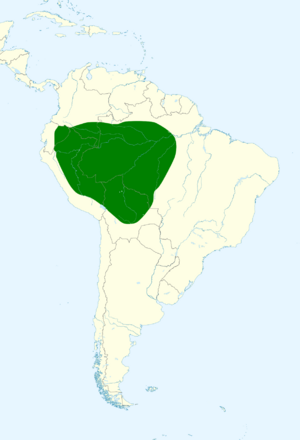Andersen's fruit-eating bat facts for kids
Quick facts for kids Andersen's fruit-eating bat |
|
|---|---|
| Conservation status | |
| Scientific classification | |
| Genus: |
Dermanura
|
| Species: |
anderseni
|
 |
|
| Synonyms | |
|
|
The Andersen's fruit-eating bat (Dermanura anderseni) is a small bat that lives in South America. It's known for its unique way of making "tents" out of leaves to rest in.
Contents
About the Andersen's Fruit-Eating Bat
Scientists first described this bat as a new species in 1916. An American zoologist named Wilfred Hudson Osgood discovered it. A helper named R. H. Becker found the first bat in 1915 in Brazil. The bat was named after a Danish scientist, Knud Andersen. Scientists sometimes change how they group animals. This bat's classification has been discussed, and some evidence suggests it could be grouped differently.
What Does It Look Like?
This bat is quite small. Its forearm, which is part of its wing, is about 34 to 36 millimeters long. That's about the length of a few paper clips! It has dark brown fur all over its body. Each bat weighs about 8 to 12 grams, which is lighter than a pencil. It has 28 teeth in total. It also has faint stripes on its face.
Where Does It Live and What Does It Eat?
The Andersen's fruit-eating bat is one of the few bat species that builds "tents." It does this by folding or cutting large leaves. These leaf tents provide a safe and hidden place for the bats to rest during the day.
This bat likely eats mostly fruit. This makes it a frugivore. It helps spread seeds from the fruits it eats, which helps new plants grow in the forest.
You can find this bat in several South American countries. These include Bolivia, Brazil, Colombia, Ecuador, and Peru. It lives in areas up to 1,300 meters (about 4,265 feet) above sea level.
How Is It Protected?
As of 2016, the IUCN (International Union for Conservation of Nature) lists the Andersen's fruit-eating bat as a least concern species. This means that its population is stable. It is not currently at high risk of disappearing.


